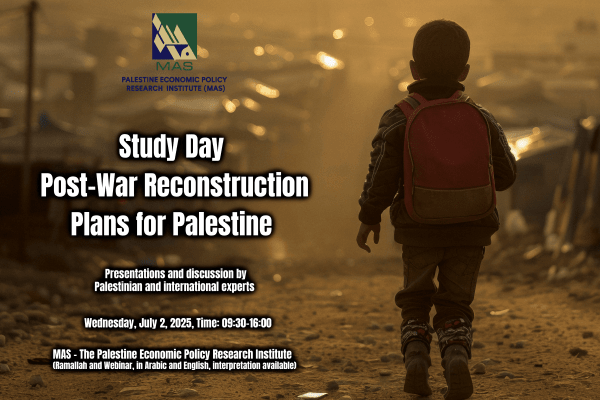Post-War Reconstruction Plans for Palestine - Study Day
As part of MAS's monitoring of the socio-economic ramifications of the war since October 2023, it is undertaking a mapping exercise prior to launching more systematic policy research and dialogue on relief, recovery, and reconstruction. Building on the abovementioned consultations on relief and recovery, it is also useful to become better acquainted with the different reconstruction schemes currently tabled for Gaza. Hence, the proposed “Study Day on Post War Reconstruction” (July 2, 2025) will plunge in depth into a number of currently suggested approaches to reconstruction and contextualise what may lay in store.
An astonishing number of studies/proposals/plans/blueprints have appeared in the past year for the so-called “Day After” of the war (which seems reluctant to arrive!), powered and funded by US, European, Arab, and Israeli “think-tanks”, “experts”, and foundations. These fall broadly in three categories. The US and other largely pro-Israeli world-class think tanks have focused on the “governance” of Gaza (and Palestine) in the aftermath of the war, especially in a way that ensures Israel’s security and eliminates Palestinian resistance. A second group of old/new ideas/plans has resurfaced on the parameters of a Palestine-Israel permanent status: two-state, one-state, apartheid state, two peoples - one land, parallel sovereignty, etc.
Finally, a dozen studies have been published tackling the future spatial planning and reconstruction models/principles, each with different urban planning, architectural, and socio-economic implications. This latter batch of reconstruction plans and studies may, in turn, be distinguished by a range of dimensions, such as the institutions or agendas they represent, the socio-economic and cultural vision they embody, and the degree to which they are consistent with Palestinian national sovereign goals and community recovery and empowerment. Other commonalities and divergences between some of these plans exist with respect to engineering and architectural design, urban planning, sustainability, feasibility, and cost. Needless to say, a number of these plans entail ethnic cleansing or, at best, an international financial consortium to build, own, and operate Gaza, as a supposedly magical deal to end a century-old war.
Several plans, including several from before the war, focus on the optimal spatial planning for the Gaza Strip, prepared by the US research institution RAND, the Gaza-2050 plan prepared by the Palestinian private sector, and the Palestinian Authority’s National Spatial Plan for Palestine. A group of Arab and Palestinian plans and studies on the reconstruction effort have covered institutional and financing options, relevant principles, and necessary socio-economic-cultural policies, and some have suggested detailed implementation plans, modern architectural visions, and innovative engineering designs.
These significant efforts by a range of players, both friendly and less so, mostly serious but some contemptible, to design the reconstruction of Palestine should be examined professionally, comparatively analyzed, and synthesized in a manner that creates a best-practice consensus vision generated from the bottom up. No one plan is ideal, none have been subjected to the light of public scrutiny and community engagement, and they all remain conditional on political outcomes on the ground in Gaza and the region. Nevertheless, it is never too late to learn more and anticipate Palestine’s future, as a first step towards reclaiming agency and ownership.
















